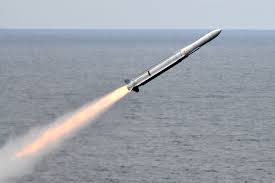记忆方法
记忆“missile”的方法可以是将其与“miss”进行关联,想象“miss”是发射导弹时瞄准动作中的“错过”的“miss”,而导弹(missile)就是要准确无误地发射出去,不会“miss”目标。通过这个想象,可以强化对“missile”作为弹道武器的记忆。
以上内容由AI生成, 仅供参考和借鉴
中文词源
missile 导弹,发射物
来自拉丁语mittere,送出,发射,词源同emit,commit,-ss,过去分词后缀。引申词义发射物,导弹。
英语词源
- missile (n.)
- "thing thrown or discharged as a weapon," is 1650s, from missile (adj.), 1610s, "capable of being thrown," chiefly in phrase missile weapon, from French missile and directly from Latin missilis "that may be thrown or hurled" (also, in plural, as a noun, "weapons that can be thrown, darts, javelins"), from missus "a throwing, hurling," past participle of mittere "to send" (see mission). Sense of "self-propelled rocket or bomb" is first recorded 1738; the modern remote guidance projectile so called from 1945.
权威例句
- 1. The plane was shot down in error by a NATO missile.
- 一枚北约的导弹误将那架飞机击落。
- 2. The guidance systems didn't work and the missile couldn't hit its target.
- 导航系统失灵,导弹未能命中目标。
- 3. They claimed to have shot down one incoming missile.
- 他们声称击落了一枚来犯的导弹。
- 4. The missile buried itself deep in the grassy hillside.
- 导弹深深地埋在杂草丛生的山坡上。
- 5. Another missile exploded harmlessly outside the town.
- 又一枚导弹在城外爆炸,没有造成任何伤害。
